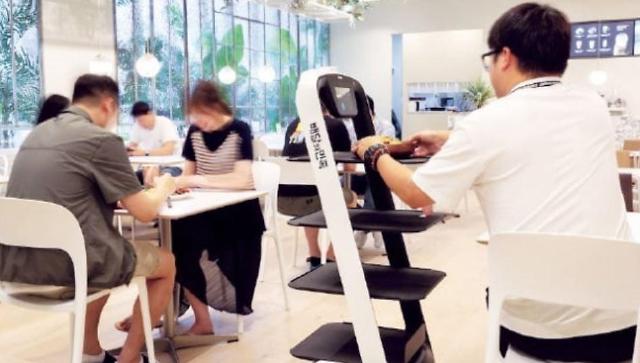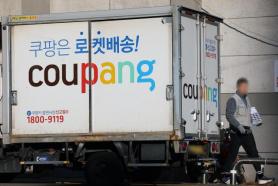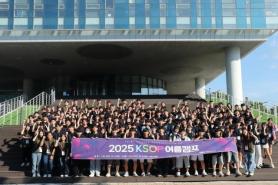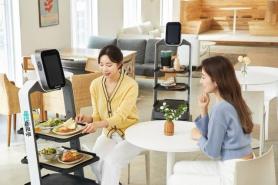
[Courtesy of Woowa Brothers]
SEOUL -- An Italian fusion restaurant backed by self-driving service robots has opened in South Korea, utilizing new technologies such as a smart order and payment system.
"Merry-go Kitchen" located in southern Seoul started treating customers on July 23. It is the brainchild of Woowa Brothers, the operator of South Korea's top food delivery service Baedal Minjok, which has invested heavily in developing autonomous robots for restaurants and self-driving food delivery vehicles.
"Merry-go Kitchen is both a restaurant for ordinary customers and a showroom for the future dining business," said Yoon Hyun-joon, vice president of Woowa's new business division. An experienced restaurant operator is responsible for menu configuration, cooking and staff management, while Woowa Implements and manages technology.
If QR (quick response) codes given to each table are recorded through an app, customers can check menus and put in orders. Payment will be made through the app, and photos and videos show the entire menu. Orderers can check when their food is served by getting a push message.
QR codes are a type of matrix barcode or two-dimensional barcode. They often contain data for a locator, identifier, or tracker that points to a website or application.
Two types of robots were deployed, one moving around the hall and the other sliding on the monorail. On the wall side are two robots that move on the monorail, carry a food tray and stop in front of the orderer's table.
The serving robot travels around the store, carrying food to up to four tables at a time. When an employee enters the table number, the serving robot carries a food tray to an orderer by picking an optimal route to avoid obstacles. The screen located on its top shows which floor menus should be taken out.
It's not all automatic. A person's hand is required to order alcoholic beverages because robots cannot make adult verification. And Woowa Brothers has yet to develop a system where the menu ordered will automatically be entered into the kitchen's system.
A note of precautions was placed on each table, asking customers to see robots only with their eyes and act carefully in the walkways to avoid hitting them and put belongings in their seats for the smooth movement of robots.
Woowa's final goal is to produce robots capable of roaming freely through the crowded urban streets to deliver food from restaurants to customers. The company has tested a food service robot at a food court in the central city of Cheonan and a Pizza Hut store in Seoul.
In December last year, Woowa partnered with Hyundai Movex, an automated logistics system provider, to develop autonomous delivery robots capable of moving between floors.
While service robots have skillfully carried out their given tasks, the development of delivery robots was slow because they are not useful in real life in a country where many city dwellers live in high-rise apartment buildings. The salient challenge is elevators. So Woowa and Hyundai Movex aim to commercialize autonomous robots which can travel smoothly between floors.
Hyundai Movex thinks the adoption of delivery robots is expected to gain speed, citing the emergence of smart cities where devices and equipment are connected by IoT device networks and super-fast wireless networks being established in new towns.
Copyright ⓒ Aju Press All rights reserved.



